De Amerikaanse schrijver, journalist en filmproducent Dominick Dunne werd geboren 29 oktober 1925 in Hartford, Connecticut. Zie ook alle tags voor Dominick Dunne op dit blog.
Uit: Another City, Not My Own
„Certainly, there are enough references to his obliteration in his journal in the months before he was found dead in the media room of his country house in Prud’homme, Connecticut, where he had been watching the miniseries of one of his novels, A Season in Purgatory. The book was about a rich young man who got away with murder because of the influence of his prominent and powerful father. Getting away with murder was a relentless theme of Gus Bailey’s. He was pitiless in his journalistic and novelistic pursuit of those who did, as well as of those in the legal profession who created the false defenses that often set their clients free. That book, the miniseries of which he was watching, had brought Gus Bailey and the unsolved murder in Greenwich, Connecticut, which, to avoid a libel suit, he had renamed Scarborough Hill, a great deal of notoriety at the time of its publication, resulting in the reopening of the murder case by the police. Gus had fervently believed that the case remained unsolved because the police had been intimidated by the power and wealth of the killer’s family, which extended all the way to the highest office in the land.
“It was exactly the same thing in the Woodward case,” said Gus, who had written an earlier novel about a famous society shooting in the aristocratic Woodward family on Long Island in the fifties called The Two Mrs. Grenvilles. “The police were simply outdazzled by the grandeur of Elsie, whom I called Alice Grenville, and Ann Woodward got away with shooting her husband.”
As always, when Gus’s passions were involved in his writing, he ruffled feathers. Powerful families became upset with him. He created enemies.
“You seem to have annoyed a great many very important people,” said Gillian Greenwood of the BBC, as a statement not a question, in the living room of Gus Bailey’s New York penthouse, where she was interviewing him on camera for a documentary on his life called The Trials of Augustus Bailey“.
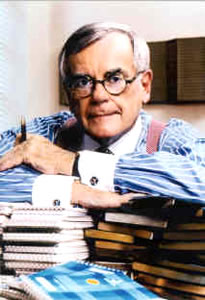
De Russische schrijver en wetenschapsfilosoof Aleksandr Aleksandrovitsj Zinovjev werd geboren in Pachtino op 29 oktober 1922. Zie ook mijn blog van 29 oktober 2010 en eveneens alle tags voor Aleksandr Zinovjev op dit blog.
Uit: Global Suprasociety and Russia (Vertaald door Helen Shelestiuk)
„I will not expand on the desperate situation, in which Russia and the Russians found themselves as a result of the crisis in their history, which happened after 1985. This information is already known from numerous sources. But there still remains a shroud of secrecy over the fact that that situation did not happen merely as a result of untoward historical developments, but had been diligently planned by certain forces in the West and artificially imposed on the Russians. That condition is the consequence of one of the greatest tragedies in the social history of mankind. The tragedy which began in the mid 1980s may with high probability have a fatal end for Russia, but I do not count on my ability to turn the course of history and ward off this end. This may only be done by a great effort of millions of people, by persistent struggle and self-sacrifice. I am moved by the call of duty of a Russian person, who sees the tragic outcome of the Russian history and thinks it criminal to keep silence.
Actual historical developments are always a combination of two processes: 1) ‘elemental’, unplanned and uncontrolled; 2) conscious-volitional, planned and controlled. Their proportions and roles vary with certain limitations. The domination of the second type will lead to a situation, when the general line of development is monitored, and only less important components may be out of control.
If we intend to give a scientific description of these processes, we will require quite different methodologies and sets of concepts. ‘Elemental’, natural processes are described with the concepts and postulates of dialectic. For the conscious-volitional processes we would need a different methodology, based on the knowledge of what social plans (projects) are, how and why they are created, how they are executed, and by what rules. Though this other methodology does not exclude dialectic, it implies an essentially different focus of attention while examining social objects.”
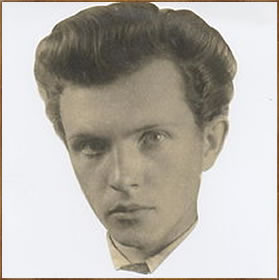
In 1938
De Duitse schrijver Georg Julius Leopold Engel werd geboren op 29 oktober 1866 in Greifswald. Zie ook alle tags voor Georg Julius Leopold Engel op dit blog en ook mijn blog van 29 oktober 2010.
Uit: Hann Klüth
„Doch ohne darauf zu achten, kaute der Lotse eine Zeitlang begierig weiter, dann spie er den Tabak wieder aus und schüttelte so mutlos das Haupt, daß die schweißnassen grauweißen Locken ihm struwlig über die Stirn fielen. – »Ne, Mudding,« stöhnte er und sank zusammen – »es wird nichts mehr. Fünfzig Jahre hab ich ihm nu gekaut. Und seit vier Tagen will’s nich mehr – kuck’ – das is ein Zeichen vom lieben Gott.«
»Ja, ja, was wollt’s nich?« nickte die kleine, ältliche Frau und faltete wieder zerknirscht die Hände. Darauf strickte sie, wie erschreckt, an dem grauen Strumpf weiter.
Dicht unter den Fenstern des Lotsenhäuschens lag zur selben Zeit eine kleine Jacht am Bollwerk angeschlossen. Sie war von oben bis unten mit Kartoffeln beladen und gehörte Johann Christian Petersen. Wenigstens stand sein Name in goldenen Buchstaben vorne an der Schiffswand. Aber der eigentliche Kapitän des Fahrzeuges war Frau Dörthe Petersen, die eben in ihrer Küchenkajüte einen Eierkuchen gebacken hatte und nun von der Steuerbordseite aus der kleinen Line, die am Bollwerk stand, ein großes Stück heraufreichte.
In der bloßen Hand. Aber das schadete nichts.
»Nu iß, mein Döchting,« sagte die starkknochige Frau, die mit nackten Füßen und hochaufgeschürzt herumging, denn aus dem kleinen Schiff wurden von zwei halberwachsenen, strohblonden Söhnen der Frau Dörthe ununterbrochen Kartoffeln über das Landungsbrett gekarrt und draußen in Säcke gefüllt. Wenn es zu langsam ging, dann sprang Frau Dörthe selbst entschlossen hinzu, um ihren beiden Sprossen je einen freundlich-aufmunternden Puff unter die Rippen zu versetzen.
»Au, Mudding, das tut jo weh!«
»Das soll es ja auch. – Man immer zu.«
Und das Karren ging weiter.
So hielt sie alles im Gang. Nur ihr Mann hockte in einem braunen, fellartigen Anzug auf dem Kajütendach und spielte, ohne sich um etwas zu kümmern, die Handharmonika.
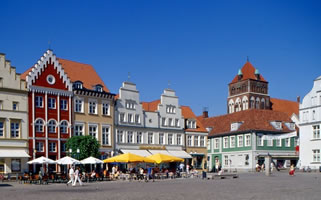
Greifswald, Markt (Geen portret beschikbaar)
De Franse schrijver, toneelauteur en beroepsdiplomaat Jean Giraudoux werd geboren op 29 oktober 1882 in Bellac/Haute-Vienne. Zie ook alle tags voor Jean Giraudoux op dit blog en ook mijn blog van 29 oktober 2010.
Uit: Electre
“EGISTHE . Il n’est pas deux façons de faire signe, président, c’est de se séparer de la troupe, monter sur une éminence, et agiter sa lanterne ou son drapeau. On trahit la terre comme on trahit une place assiégée, par des signaux. Le philosophe les fait de sa terrasse, le poète ou le désespéré les fait, de son balcon ou de son plongeoir. Si les Dieux, depuis dix ans n’arrivent point à se mêler de notre vie, c’est que j’ai veillé à ce ce que les promontoires soient vides est les champs de foire combles, c’est que j’ai ordonné le mariage des rêveurs, des peintres et des chimistes ; c’est que, pour éviter de créer entre nos concitoyens ces différences de race morale qui ne peuvent manquer de colorer différemment le hommes aux yeux des Dieux, j’ai toujours feint d’attribuer une importance énorme aux délits et dérisoire aux crimes. Rien n’entretient mieux la fixité divine que la même atmosphère égale autour des assassinats et des vols de pain . Je dois reconnaître que sur ce point, la justice des tribunaux m’a abondamment secondé. Et toutes les fois où j’ai été obligé de sévir, de là haut on ne l’a point vu. Aucune de mes sanctions n’a été assez voyante pour permettre aux Dieux l’ajustement de leur vengeance. Pas d’exil. Je tue. L’exilé a la même tendance à grimper les chemins escarpés que la coccinelle. Et je ne monte pas mes supplices en évidence. Alors que nos pauvres villes voisines se trahissent elles-mêmes en érigeant leur gibet au faîte des collines, moi je crucifie au fond des vallées. Et maintenant, j’ai tout dit sur Electre..”.
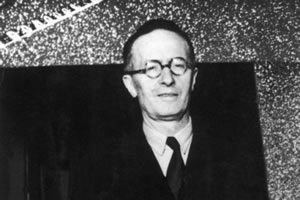
De Franse dichter André Chénier (eigentlich André Marie Chénier ofde Chénier) werd geboren op 29 oktober 1762 in Galata bij Constantinopel. Zie ook alle tags voor André Chénier op dit blog en ook mijn blog van 29 oktober 2010.
A Fanny (I)
Non, de tous les amants les regards, les soupirs
Ne sont point des pièges perfides.
Non, à tromper des coeurs délicats et timides
Tous ne mettent point leurs plaisirs.
Toujours la feinte mensongère
Ne farde point de pleurs, vains enfants des désirs,
Une insidieuse prière.
Non, avec votre image, artifice et détour,
Fanny, n’habitent point une âme ;
Des yeux pleins de vos traits sont à vous. Nulle femme
Ne leur paraît digne d’amour.
Ah ! la pâle fleur de Clytie
Ne voit au ciel qu’un astre ; et l’absence du jour
Flétrit sa tête appesantie.
Des lèves d’une belle un seul mot échappé
Blesse d’une trace profonde
Le coeur d’un malheureux qui ne voit qu’elle au monde.
Son coeur pleure en secret frappé,
Quand sa bouche feint de sourire.
Il fuit ; et jusqu’au jour, de son trouble occupé,
Absente, il ose au moins lui dire
Fanny, belle adorée aux yeux doux et sereins,
Heureux qui n’ayant d’autre envie
Que de vous voir, vous plaire et vous donner sa vie,
Oublié de tous les humains,
Près d’aller rejoindre ses pères,
Vous dira, vous pressant de ses mourantes mains
Crois-tu qu’il soit des coeurs sincères ?
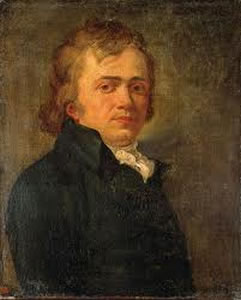
Anoniem, Musée de Carnavalet, Parijs
